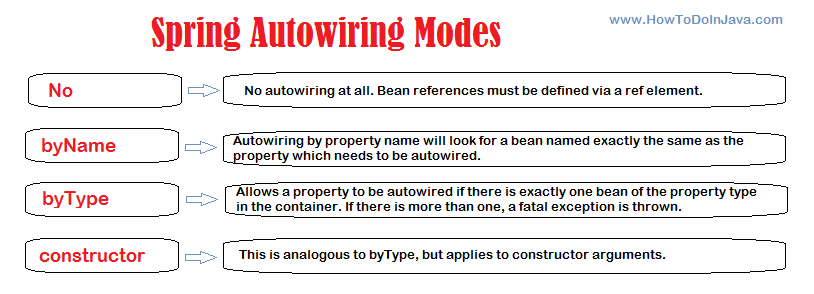Spring系列七:Spring 自动装配
相思相见知何日?此时此夜难为情。
概述
在Spring框架中,在配置文件中声明bean的依赖关系是一个很好的做法,因为Spring容器能够自动装配协作bean之间的关系。这称为spring自动装配。
自动装配功能具有四种模式。分别是 no,byName,byType和constructor。
已弃用另一种自动连线模式自动检测。
Docs说autodetect选项提供了太多的magic,最好使用更明确的声明。
XML配置中的默认自动装配模式为no。Java配置中的默认自动装配模式是byType。
自动装配模式
no
该选项是spring框架的默认选项,表示自动装配为关闭状态OFF。我们必须在bean定义中使用<property>标签显式设置依赖项。byName
此选项启用基于bean名称的依赖项注入。在Bean中自动装配属性时,属性名称用于在配置文件中搜索匹配的Bean定义。如果找到这样的bean,则将其注入属性。如果找不到这样的bean,则会引发错误。byType
此选项支持基于bean类型的依赖项注入。在bean中自动装配属性时,属性的类类型用于在配置文件中搜索匹配的bean定义。如果找到这样的bean,就在属性中注入它。如果没有找到这样的bean,就会引发一个错误。constructor
通过构造函数自动装配与byType相似,仅适用于构造函数参数。在启用了自动装配的bean中,它将查找构造函数参数的类类型,然后对所有构造函数参数执行自动装配类型。请注意,如果容器中没有一个完全属于构造函数参数类型的bean,则会引发致命错误。
@Autowired 注解
除了bean配置文件中提供的自动装配模式之外,还可以使用@Autowired注解在bean类中指定自动装配。要在bean类中使用@Autowired自动注入,必须首先使用以下配置在spring应用程序中启用自动注入。
启用注解配置
<context:annotation-config />
使用配置文件中的AutowiredAnnotationBeanPostProcessor bean定义可以实现相同的目的。
<bean class ="org.springframework.beans.factory.annotation.AutowiredAnnotationBeanPostProcessor"/>
使用@Autowired注解
现在,启用注解配置后,可以随意使用@Autowired自动连接bean依赖项。这可以通过三种方式完成:
@Autowired属性
在属性上使用@Autowired时,等效于在配置文件中通过byType自动注入
public class EmployeeBean
{
@Autowired
private DepartmentBean departmentBean;
public DepartmentBean getDepartmentBean() {
return departmentBean;
}
public void setDepartmentBean(DepartmentBean departmentBean) {
this.departmentBean = departmentBean;
}
//More code
}
@Autowired在属性setter方法上
在属性的setter方法上使用@Autowired时,它也等效于在配置文件中通过byType进行自动装配。
public class EmployeeBean
{
private DepartmentBean departmentBean;
public DepartmentBean getDepartmentBean() {
return departmentBean;
}
@Autowired
public void setDepartmentBean(DepartmentBean departmentBean) {
this.departmentBean = departmentBean;
}
//More code
}
@Autowired在构造函数上
在bean的构造函数上使用@Autowired时,它也等同于在配置文件中通过 constructor进行自动装配。
package cn.howtodoinjava.autowire.constructor;
public class EmployeeBean
{
@Autowired
public EmployeeBean(DepartmentBean departmentBean)
{
this.departmentBean = departmentBean;
}
private DepartmentBean departmentBean;
public DepartmentBean getDepartmentBean() {
return departmentBean;
}
public void setDepartmentBean(DepartmentBean departmentBean) {
this.departmentBean = departmentBean;
}
//More code
}
@Qualifier解决冲突
我们了解到,如果我们在byType模式下使用自动装配,容器会在属性类类型中查找依赖项。如果找不到这样的类型,则会引发错误。但是,如果有两个或多个相同类类型的bean,该怎么办?
在这种情况下,spring将无法选择正确的bean来注入属性,因此你将需要使用@Qualifier注解来帮助容器。
要解析特定的bean,我们需要使用@Qualifier注解以及@Autowired注解,并将bean名称传递到注解参数中。看看下面的例子:
public class EmployeeBean{
@Autowired
@Qualifier("finance")
private DepartmentBean departmentBean;
public DepartmentBean getDepartmentBean() {
return departmentBean;
}
public void setDepartmentBean(DepartmentBean departmentBean) {
this.departmentBean = departmentBean;
}
//More code
}
其中重复的bean配置如下:
<?xml version="1.0" encoding="UTF-8"?>
<beans>
<context:annotation-config />
<bean id="employee" class="cn.howtodoinjava.autowire.constructor.EmployeeBean" autowire="constructor">
<property name="fullName" value="Lokesh Gupta"/>
</bean>
<!--First bean of type DepartmentBean-->
<bean id="humanResource" class="cn.howtodoinjava.autowire.constructor.DepartmentBean" >
<property name="name" value="Human Resource" />
</bean>
<!--Second bean of type DepartmentBean-->
<bean id="finance" class="cn.howtodoinjava.autowire.constructor.DepartmentBean" >
<property name="name" value="Finance" />
</bean>
</beans>
使用required = false进行错误安全的自动装配
即使在自动装配Bean依赖项时已格外小心,仍然可能会发现奇怪的查找失败。因此,要解决此问题,您将需要使自动装配成为可选的,以便在未找到依赖项的情况下,应用程序不应引发任何异常,而自动装配应被忽略。
这可以通过两种方式完成:
- 如果要使特定的
bean属性的非强制性的特定bean自动装配,可以在@Autowired注解中使用required =“ false”属性。@Autowired (required=false) @Qualifier ("finance") private DepartmentBean departmentBean;` - 如果要在全局级别(即对所有
bean中的所有属性)应用可选的自动装配;使用以下配置设置。<bean class="org.springframework.beans.factory.annotation.AutowiredAnnotationBeanPostProcessor"> <property name="requiredParameterValue" value="false" /> </bean>
从自动装配中排除bean
默认情况下,自动装配扫描并匹配范围内的所有bean定义。如果您想排除一些bean定义,这样它们就不能通过自动装配模式被注入,可以使用设置为false的autowire-candidate来做到这一点。
- 使用
autowire-candidate作为false完全将bean排除在自动装配候选之外。它将特定的bean定义完全排除在自动装配基础结构之外。<?xml version="1.0" encoding="UTF-8"?> <beans> <context:annotation-config /> <bean id="employee" class="cn.howtodoinjava.autowire.constructor.EmployeeBean" autowire="constructor"> <property name="fullName" value="Lokesh Gupta"/> </bean> <!--Will be available for autowiring--> <bean id="humanResource" class="cn.howtodoinjava.autowire.constructor.DepartmentBean" > <property name="name" value="Human Resource" /> </bean> <!--Will not participate in autowiring--> <bean id="finance" class="cn.howtodoinjava.autowire.constructor.DepartmentBean" autowire-candidate="false"> <property name="name" value="Finance" /> </bean> </beans> - 另一种方法是根据
bean名称的模式匹配来限制自动装配候选对象。顶级<beans/>元素在其default-autowire-candidate属性中接受一个或多个属性。
例如,要将自动装配候选状态限制为名称以Impl结尾的任何bean,请提供值* Impl。要提供多种模式,请在以逗号分隔的列表中定义它们。<?xml version="1.0" encoding="UTF-8"?> <beans default-autowire-candidates="*Impl,*Dao"> <context:annotation-config /> <bean id="employee" class="com.howtodoinjava.autowire.constructor.EmployeeBean" autowire="constructor"> <property name="fullName" value="Lokesh Gupta"/> </bean> <!--Will be available for autowiring--> <bean id="humanResource" class="com.howtodoinjava.autowire.constructor.DepartmentBean" > <property name="name" value="Human Resource" /> </bean> <!--Will not participate in autowiring--> <bean id="finance" class="com.howtodoinjava.autowire.constructor.DepartmentBean" autowire-candidate="false"> <property name="name" value="Finance" /> </bean> </beans>
请注意,bean定义的autowire-candidate属性的值true或false始终优先,而对于此类bean,模式匹配规则将不适用。
这就是Spring bean自动装配的全部内容。
🙂🙂🙂关注微信公众号java干货
不定期分享干货资料






 浙公网安备 33010602011771号
浙公网安备 33010602011771号